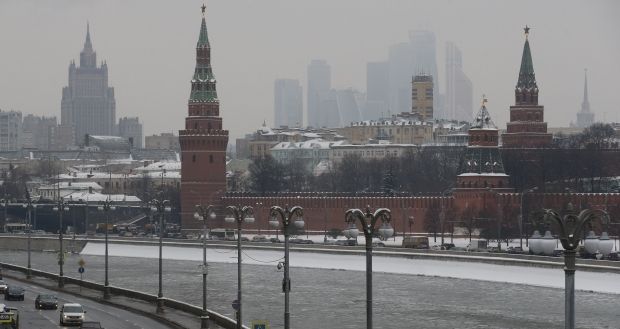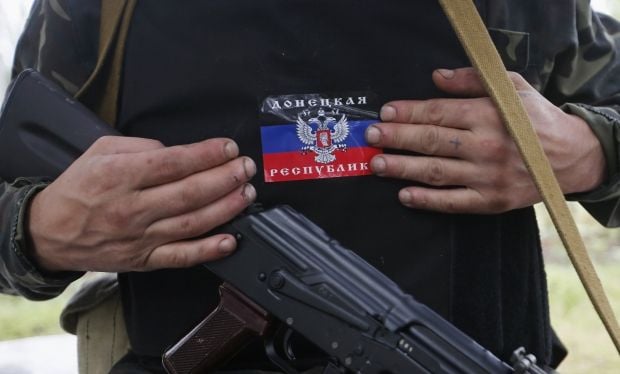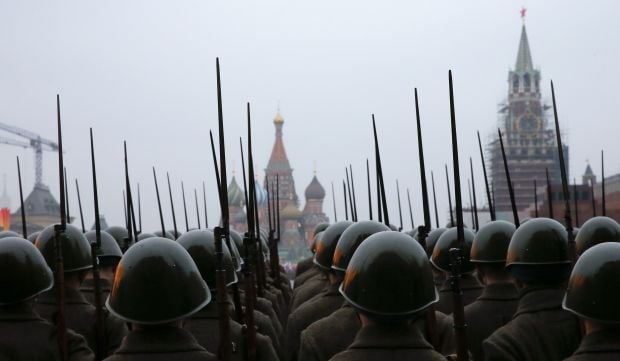
When ‘spiritual ties’ are strangling
The Investigative Committee of the Russian Federation never ceases to amaze the general public. Rather than restoring order in Russia, the IC regularly “amazes” us with new criminal cases regarding Ukraine.
On Monday, March 30, the IC opened a criminal case into the desecration of symbols of “Russia’s military glory committed publicly on the territory of Ukraine.” “The main investigation department of the IC initiated criminal proceedings under Art. 244 part 2 of the Criminal Code (Desecration of the dead and their burial places) and Art. 354.1 part 3 of the Criminal Code (Rehabilitation of Nazism) on the fact of destruction, damage or desecration of sculptural and architectural structures dedicated to the fight against fascism and the victims of fascism, burial places of participants in the struggle against fascism, as well as the desecration of symbols of the military glory of Russia, publicly committed on the territory of Ukraine,” says the official agency.
Russian investigators say that they have concrete evidence of the destruction and desecration by unidentified persons in 2014 of monuments dedicated to Soviet soldiers’ fight against fascism on the territory of Ukraine. Moreover, the IC has been meticulously collecting the “evidence” since January 2014 all over Ukraine. And the “rehabilitation of Nazism” (of course, in Russian investigators’ understanding) happened in the Lviv, Dnipropetrovsk, Odesa regions, also Kyiv and even Kharkiv. Many of those regions are usually referred to in Russian media as cradles of the “banderivtsi” (the term commonly used after 1940s by Soviet, and now Russian, propaganda to identify Ukrainian nationalists, followers of Stepan Bandera – leader of the Organization of Ukrainian Nationalists).
The IC explains its interest in the investigation of the collected “evidence” by the fact that the Russian Federation is the legal successor of the Soviet Union, and, as the “destroyed and desecrated” monuments are the symbols of military glory of Soviet soldiers in the fight against fascism, the IC believes that “mentioned unlawful activity is directed against the interests of the Russian Federation.”
Russian investigators step beyond reality
It should be noted that this is not the first criminal case opened by the IC in regard to the activity that has been supposedly committed on Ukraine’s territory. For example, in May last year, after Russia had already annexed Crimea, the IC opened a criminal case against the Ukrainian military, the National Guard and representatives of the so-called Right sector “on the shelling of Slavyansk, Kramatorsk, Donetsk, Mariupol and other settlements in the self-proclaimed Donetsk and Luhansk People's Republics.” It should be reminded that Russia has officially recognized neither the DPR nor LPR.
However, why should one be surprised with this behavior if the Russian investigators do not reject even outright lies? For example, in late March 2015, (during the truce declared in the Second Minsk agreements and the withdrawal of heavy weapons from the contact line in the East of Ukraine) the IC claimed that “unidentified persons from among the members of the Armed Forces of Ukraine and the National Guard of Ukraine, acting on the grounds of political and ideological hatred and enmity, conspired to use heavy types of an indiscriminate nature in artillery attacks on the territories of the self-proclaimed Donetsk People's Republic.” However, the thing is that there were no artillery attacks on the mentioned settlements during the period, as stated by the IC in a criminal case opened on grounds of crimes provided for in paragraphs Art. 105 part 2 paragraphs “a, c, f, g, l” of the Criminal Code (Murder of two or more persons by acting in a manner endangering the lives of many people) and Art. 356 part 1 of the Criminal Code (Usage of prohibited means and methods of warfare),” and this was also confirmed by representatives of the self-proclaimed DPR.

Taras Berezovets, a political strategist and the director of Berta Communications, a company for personal and strategic consulting, also noted that the IC opened several criminal cases against members of the Verkhovna Rada of Ukraine for alleged incitement to terrorism. For example, last December, Ukrainian MPs Andriy Levus, Ihor Mosiychuk and Yuriy Bereza were referred to as “Nazis.” “The Investigative Committee of the Russian Federation is just like those ‘slashers’, ‘oprichniki’ who had a semi-legal status and used the most repressive methods in the times of Ivan the Terrible, said the expert.
According to him, in this case the IC does things that even the police and the Federal Security Service hesitate to do. “Roughly speaking, the FSB and the police don’t dare to openly carry out illegal activity, but the Investigative Committee doesn’t mind doing so, opening absolutely absurd cases against foreign actors who have diplomatic immunity and who would never be given away by any country,” said Berezovets.
Propaganda instead of law
The present case opened by the IC doesn’t hold water, it’s even beyond the legal framework of Russian investigators. “This issue is beyond their legal framework, as the Investigative Committee of Russia has nothing to do with the legal framework of Ukraine, another sovereign state,” Ukrainian lawyer and deputy head of the Central Election Commission Andriy Mager told UNIAN.
In this regard, it is rather a political question, in his opinion, and the actions of the IC have purely propagandistic purposes, since, according to Ukrainian legislation, not only the state symbols of Ukraine, but also symbols of a foreign state are subject to preservation and protection. The lawyer explained that there is a corresponding article in the Ukraine’s Criminal Code. Therefore, if the facts alleged in the statement by the IC have taken place, they are to be investigated by law enforcement agencies of Ukraine. “Therefore, any moves by the Investigative Committee of another state in regard to acts that took place on the territory of Ukraine look ridiculous,” says Mager.
The same thought is shared by Bohdan Yaremenko, a former Consul General of Ukraine in Edinburgh and Istanbul, who believes that Russia continues to stick to its ideological line, presenting itself as a successor-state to the Soviet Union and the winner of the Great Patriotic War.
As for the legal component, Yaremenko sees the actions of the IC as “complete nonsense.” “Because any crime, offense, or contract, they all have a certain jurisdiction. If something happens in the territory of Ukraine, then, accordingly, Ukrainian law enforcement agencies, local judicial authorities must react, but not the Russian Federation,” he said.
Moreover, the IC or other Russian entities have no authority in Ukraine whatsoever. “This is a flagrant violation of international law, principles of law, the existing agreements between Ukraine and Russia. And this is yet another proof of the Kremlin’s aggressive foreign policy,” says Yaremenko.
According to him, by fanning the issue of “spiritual ties”, “the memory of ancestors” and other traditional issues, Russia is trying to stir up newsmakers that are “one way or another connected with the ideological context in which the actual foreign and domestic policy of the Kremlin unfolds."
Volodymyr Fesenko, head of the Penta Center for applied political studies, agrees with this point of view. He believes that the actions of the IC are yet another violation of international law. “With regard to bilateral relations this is not the first, nor the last such case. One should pay attention to the audacity of Russia's actions, with criminal cases being opened in regard to Ukraine. Ukrainian territory is not an area of Russia’s jurisdiction,” said the expert.

According to him, Ukraine may, too, begin to open criminal cases, similar to Russian. “But if we open a case regarding, for example, an accident that occurred in the territory of the Russian Federation, would anyone treat that seriously?” wondered Fesenko.
However, the analyst is confident that for every IC’s “investigation” there should be an according response by Ukrainian Foreign Ministry.
Discrediting Ukraine and Ukrainians
After all, the Kremlin's actions (and there are no doubts that the opening criminal cases by the IC can be branded as such), come down to further demonization of Ukraine. And an “escalation” is to be expected in the following month. According to Yuriy Yakymenko, director of political and legal programs for the Razumkov Center, the current case opened by the IC is directly related to the attempt to present Ukraine as a Nazi country on the eve of the Victory Day. “It is difficult to comment on the actions of the IC in terms of rationality and common sense. Why are they doing it? In fact, this is the means of the information war waged by Russia against Ukraine in order to show that in Ukraine there are Nazis, those who deny a major victory in the Great Patriotic War, those who want to make heroes of fascists and Nazis. This fits in their propaganda framework... especially on the eve of the Victory Day on May, 9. This is an attempt to portray Ukraine as a fascist state,” said the expert.
Yakymenko does not exclude that this case will be used in the Russian media as a continuation of the chain of similar decisions of the IC “on the persecution of Ukrainian “chasteners.”
On the other hand, the expert does not exclude that, despite the impossibility for IC to conduct any investigative actions in the legal field in Ukraine, Moscow may use such “investigations” as a pretext for the arbitrary detention of Ukrainian citizens in Russia. And this is a real danger for the Ukrainians in the Russian Federation.
In his opinion, it will stimulate Ukraine’s further alienation from Russia on a public level. “And this is the testimony of the inverted reality that the Russian authorities are trying to impose on their citizens in regard to Ukraine,” said Yakymenko.
... And while the Investigative Committee of the Russian Federation is concerned with the “rehabilitation of Nazism” in Ukraine, a neo-Nazi forum is freely held in St. Petersburg, on Moscow streets Russian Nazi gangs beat passers-by (sometimes killing them) with impunity, and in the Russian provinces local authorities destroy monuments dedicated to the fight of Soviet soldiers against fascism. But the IC does not seem to care about it.
Konstantin Goncharov, Tatiana Urbanskaya

